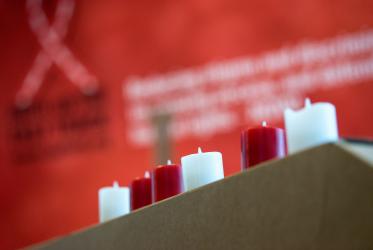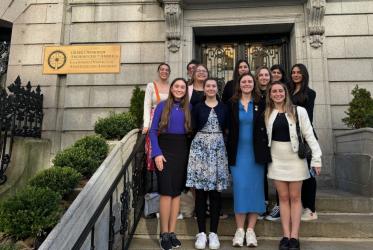Faith-based organizations are at the heart of a special mission: issuing a call to action—to ensure that infants, children and adolescents around the world have access to HIV prevention, testing and treatment.
Gathering in New York on 13 September for an interfaith prayer breakfast hosted by the World Council of Churches–Ecumenical Advocacy Alliance (WCC-EAA) in collaboration with UNAIDS, the United States President’s Emergency Plan for AIDS Relief and the United Nations Interagency Task Force on Religion and Development on the sidelines of the 72nd session of the United Nations General Assembly, faith leaders from a multitude of religions came together to support a coordinated faith-based effort in responding to HIV.
“The role of faith-based organizations in the communities is crucial to the HIV response,” said World Council of Churches general secretary Rev. Dr Olav Fykse Tveit in welcoming the participants. “Their preaching, teaching and caring changes people.”
“Children should be at the centre of our attention and work,” Tveit continued. “They are the most vulnerable, and at the same time the least responsible for this situation. So let’s do this together – we can. May God give us the courage.”
Faith-based organizations have played a critical role in responding to HIV since the start of the epidemic more than 35 years ago. A unique position of trust at the heart of communities has allowed faith-based organizations to provide services and support that extend beyond the reach of many public-sector health systems.
“When we look at the data we have, we can now see precisely who is being left behind,” said U.S. ambassador-at-large Deborah L. Birx, M.D., coordinator of the United States Government Activities to Combat HIV/AIDS and U.S. Special Representative for Global Health Diplomacy. ”There is still stigma and discrimination, and still that barrier where parents do not want to come forward to risk being identified as HIV positive. This is where we need the churches, to ensure that every pregnant woman feels the love of God, and understands that we are there to serve and ensure that their infant is tested in time.”
”Our partnership is key,” continued Dr Luiz Loures, deputy executive director of UNAIDS and assistant secretary general of the United Nations. ”Faith-based organizations are not just a part of the response but at the core of it. I am clear now that much more is needed - we need to step up our action to achieve the paediatric targets.”
In 2016 faith-based organizations have held a series of consultations on how to accelerate action at the Vatican in Rome, and in June 2017, the WCC-EAA launched a global call to action entitled “Act now for children and adolescents living with HIV”, to mobilize faith communities around the target of providing 1.6 million children and 1.2 million adolescents living with HIV with antiretroviral therapy by 2018, and the ultimate goal of ending AIDS in children by 2020.
There are good reasons for the call to action. UNAIDS’ latest report shows that in 2016 there were 2.1 million children ages 0-14 living with HIV, of which less than half had access to treatment, and 2.1 million adolescents ages 10-19 were living with HIV, a 30% increase from 2005.
Behind low coverage lies low detection rates, where in 2016 only 43% of HIV-exposed infants received early infant diagnostic services within the first two months of life, as recommended. And globally, HIV remains the seventh leading cause of death among children aged 10–14 years in 2015, and the ninth leading cause of death among adolescents overall, despite the availability of effective treatment.
Concerted global efforts are being made to address these challenges. In 2016, United Nations Member States committed to put special emphasis on providing 1.6 million children with access to antiretroviral therapy by 2018 and ensuring that children, adolescents and adults living with HIV know their status and are immediately offered and sustained on affordable and accessible quality treatment.
These ambitious targets, called the super-fast track for children, have been incorporated into a framework for action led by UNAIDS, PEPFAR and partners: Start Free, Stay Free, AIDS Free, which seeks to put the world firmly on a path to ending AIDS among children.
The engagement of the faith community is paramount to achieving these goals and at the 13 September event, a variety of calls to action and declarations were formulated, calling for strong follow-up actions, recommendations and commitments to ensure a Fast-Track faith-based response to make HIV testing and treatment available for children and adolescents by 2020.
“We come here today not to criticise or blame but to offer help and encouragement as well as to share the urgency and moral imperative of this issue,” concluded keynote speaker Sister Carol Keehan, president & CEO of the Catholic Health Association. “We are literally talking about survival. The survival of children which depends on effective action by the nations of the world. We are each called to look to our faith as the foundation for our response to HIV.”
Download high-resolution photos from the New York events, free of charge
“It will take faith to get down to business, to overcome HIV and AIDS” (WCC press release of 13 September 2017)
Call to Action: Act now for children and adolescents living with HIV
Start Free, Stay Free, AIDS Free Framework
Vatican meetings urge accelerated access to HIV testing and treatment for children (UNAIDS press release of 19 April 2016)
Faith-based organizations vital to the response to HIV (UNAIDS press release of 19 June 2017)







